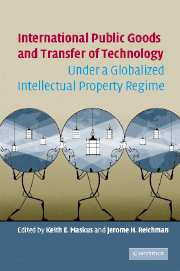Book contents
- Frontmatter
- Contents
- List of contributors
- Preface
- PART I International Provision of Public Goods under a Globalized Intellectual Property Regime
- PART II Innovation and Technology Transfer in a Protectionist Environment
- PART III Sectoral Issues: Essential Medicines and Traditional Knowledge
- PART IV Reform and Regulation Issues
- 22 Issues Posed by a World Patent System
- 23 Intellectual Property Arbitrage: How Foreign Rules Can Affect Domestic Protections
- 24 An Agenda for Radical Intellectual Property Reform
- Comment: Whose Rules, Whose Needs? Balancing Public and Private Interests
- 25 Diffusion and Distribution: The Impacts on Poor Countries of Technological Enforcement within the Biotechnology Sector
- 26 Equitable Sharing of Benefits from Biodiversity-Based Innovation: Some Reflections under the Shadow of a Neem Tree
- 27 The Critical Role of Competition Law in Preserving Public Goods in Conflict with Intellectual Property Rights
- 28 Expansionist Intellectual Property Protection and Reductionist Competition Rules: A TRIPS Perspective
- 29 Can Antitrust Policy Protect the Global Commons from the Excesses of IPRs?
- Comment I: Competition Law as a Means of Containing Intellectual Property Rights
- 30 “Minimal” Standards for Patent-Related Antitrust Law under TRIPS
- Comment II: Competitive Baselines for Intellectual Property Systems
- 31 WTO Dispute Settlement: Of Sovereign Interests, Private Rights, and Public Goods
- 32 The Economics of International Trade Agreements and Dispute Settlement with Intellectual Property Rights
- 33 Intellectual Property Rights and Dispute Settlement in the World Trade Organization
- 34 WTO Dispute Resolution and the Preservation of the Public Domain of Science under International Law
- 35 Recognizing Public Goods in WTO Dispute Settlement: Who Participates? Who Decides? The Case of TRIPS and Pharmaceutical Patents Protection
- Index
26 - Equitable Sharing of Benefits from Biodiversity-Based Innovation: Some Reflections under the Shadow of a Neem Tree
Published online by Cambridge University Press: 05 May 2010
- Frontmatter
- Contents
- List of contributors
- Preface
- PART I International Provision of Public Goods under a Globalized Intellectual Property Regime
- PART II Innovation and Technology Transfer in a Protectionist Environment
- PART III Sectoral Issues: Essential Medicines and Traditional Knowledge
- PART IV Reform and Regulation Issues
- 22 Issues Posed by a World Patent System
- 23 Intellectual Property Arbitrage: How Foreign Rules Can Affect Domestic Protections
- 24 An Agenda for Radical Intellectual Property Reform
- Comment: Whose Rules, Whose Needs? Balancing Public and Private Interests
- 25 Diffusion and Distribution: The Impacts on Poor Countries of Technological Enforcement within the Biotechnology Sector
- 26 Equitable Sharing of Benefits from Biodiversity-Based Innovation: Some Reflections under the Shadow of a Neem Tree
- 27 The Critical Role of Competition Law in Preserving Public Goods in Conflict with Intellectual Property Rights
- 28 Expansionist Intellectual Property Protection and Reductionist Competition Rules: A TRIPS Perspective
- 29 Can Antitrust Policy Protect the Global Commons from the Excesses of IPRs?
- Comment I: Competition Law as a Means of Containing Intellectual Property Rights
- 30 “Minimal” Standards for Patent-Related Antitrust Law under TRIPS
- Comment II: Competitive Baselines for Intellectual Property Systems
- 31 WTO Dispute Settlement: Of Sovereign Interests, Private Rights, and Public Goods
- 32 The Economics of International Trade Agreements and Dispute Settlement with Intellectual Property Rights
- 33 Intellectual Property Rights and Dispute Settlement in the World Trade Organization
- 34 WTO Dispute Resolution and the Preservation of the Public Domain of Science under International Law
- 35 Recognizing Public Goods in WTO Dispute Settlement: Who Participates? Who Decides? The Case of TRIPS and Pharmaceutical Patents Protection
- Index
Summary
Biodiversity-based innovation as a cooperative tradeoff between developed and developing countries
As everybody knows, much advanced innovation in the pharmaceutical sector, as well as in the agricultural field (concerning seeds, in particular) is based on germplasm (the physical embodiment of so-called biodiversity). Much of this resource “wealth,” which rarely survives in developed countries, has been preserved by farmers in developing countries “for cultural reasons which may escape those of us who equate wisdom to economic calculus.”
Such innovation is typically based on cooperation between developed countries and developing countries. The former possess the technology that enables them to develop new products for mass consumption (more advanced and efficient drugs, healthier and more resistant or abundant food) from the germplasm provided by plant and animal genetic resources that the latter have preserved, and made available. The end result can, of course, be patented: for example, the patenting of “an invention based on biological material of plant or animal origin” is expressly permitted by the European Directive on Biodiversity of 1998, and it is commonly allowed in most non-EU countries, including the U.S. and Japan. Thanks to patent protection, biodiversity-related innovation – chiefly concerning the pharmaceutical and the agricultural industries – can yield potentially very high benefits, both in strictly economic terms (returns from sales and/or royalties) and in terms of technical and scientific progress (further impulse to R&D activities) and industrial and commercial advancement.
- Type
- Chapter
- Information
- International Public Goods and Transfer of Technology Under a Globalized Intellectual Property Regime , pp. 695 - 706Publisher: Cambridge University PressPrint publication year: 2005



